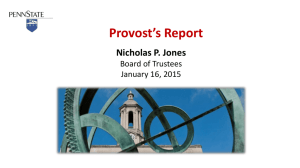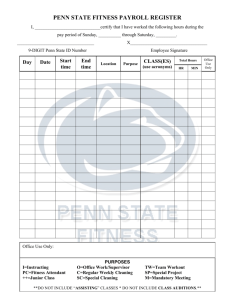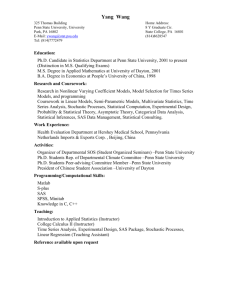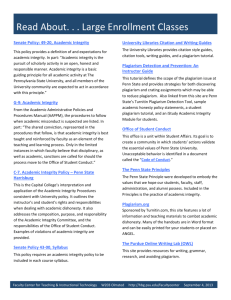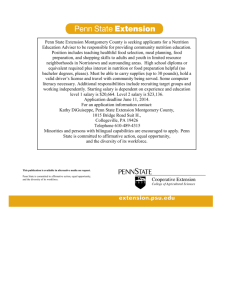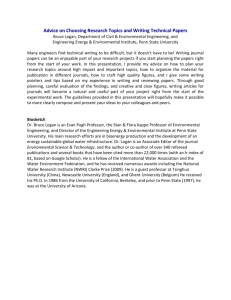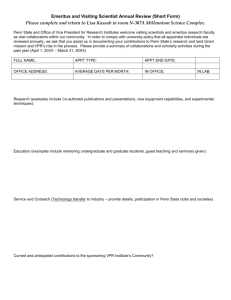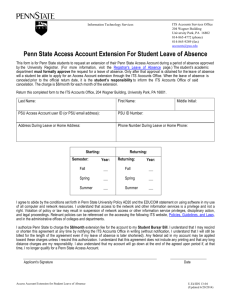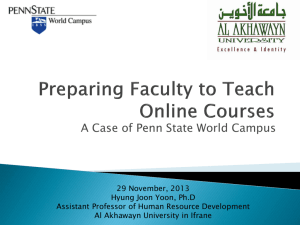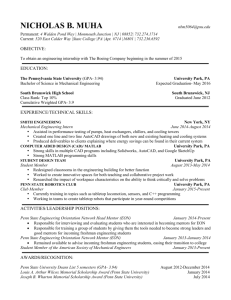Academic Integrity - Penn State University
advertisement
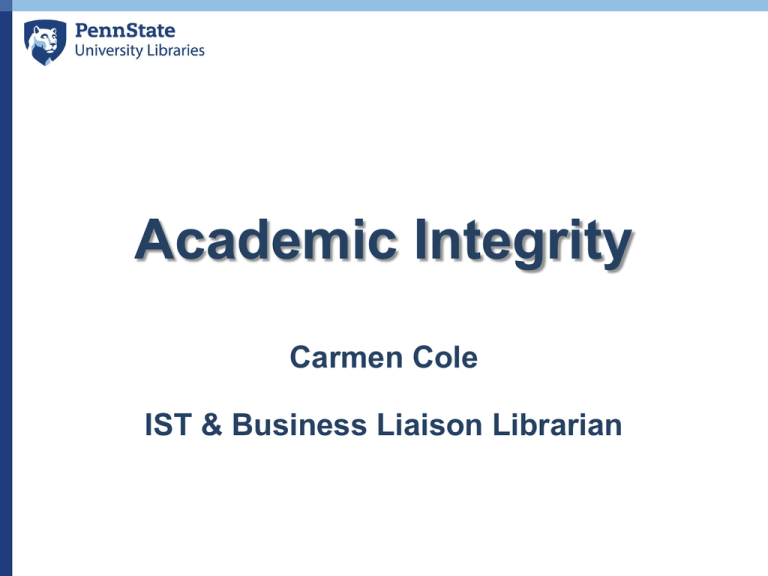
Academic Integrity Carmen Cole IST & Business Liaison Librarian Penn State’s Definition of Academic Integrity: “Academic integrity is the pursuit of scholarly activity in an open, honest and responsible manner. Academic honesty is a basic guiding principle for all academic activity at The Pennsylvania State University, and all members of the University community are expected to act in accordance with this principle. Consistent with this expectation, the University’s Code of Conduct states that all students should act with personal integrity, respect other students’ dignity, rights and property, and help create and maintain an environment in which all can succeed through the fruits of their efforts.” --Policy 49-20 (Policies and Rules for Undergraduate Students) A Quick Comparison: Plagiarism: Cheating, Copying, Stealing, Fabricating, Misleading, Unethical, Fraudulent, Dishonest Academic Integrity: Open, Honest, Responsible, Respectful, Ethical, Creative, Diligent, Successful Some Excuses for Plagiarism “I didn’t know!” “I’m too busy!” “My work isn’t good enough!” What do you think are some solutions to these problems? After the TLT Plagiarism Tutorial (2014) How Does the Library Fit Into All of This? Think of us as your third party consultants… Disclaimers: We’re not here to bust you! – We want you to succeed (remember that whole ask thing? ASK! That’s what we’re here for!) We don’t expect you to be a pro! – But we expect to you try! But, There Are A Few Things You Should Be Aware Of… • There may be consequences should you violate academic integrity • These consequences may range anywhere from a disciplinary warning to receiving an “XF” on your transcript After the Undergraduate Advising Handbook (2016) TurnitIn: • Program that gauges the originality of student work and aids in detecting plagiarism • Used in more than 6,500 institutions, 106 countries, and 30 languages • Over 1,500 instructors at Penn State have accounts Turnitin Searches: • 45+ billion pages of digital content • 337 million submissions to the student archive (including PSU students) • 130,000+ professional, academic, and commercial journals and publications • English and non-English content After Dan Hickey and Turnitin FAQs (2015). Remember: As members of the Penn State community, we’re going to maintain a culture of integrity, respect, and creativity in all our academic endeavors. It’s good to be informed, and when you act according to the above values, you eliminate a lot of worry from your life! Group Discussion Questions: • What makes you feel “trusted” or “not trusted” by instructors? • What are some positive messages you would appreciate hearing from instructors about academic honesty? • What is your best advice that you would give someone that is considering violating academic integrity? After Lisa Lenze, 2016 Is this a violation of academic integrity? Why or why not? Carlos turned in his final 10-page report for his class. Upon evaluation, the instructor found that a total of 5% of Carlos’ entire report was copied from a website, word-for-word. Adapted from: Chen, Ying; Giacobe, Nick; Kim, Hyun-Woo; Kim, Jungyoon. (2009). What would you do? Unpublished class presentation for IST 602: Supervised Experience in College Teaching. Penn State University. Is this a violation of academic integrity? Why or why not? Sue completed an essay for a homework assignment. Her paragraphs appeared to be paraphrased from her sources. She provided a bibliography in which she listed all the source material that she used. Adapted from: Chen, Ying; Giacobe, Nick; Kim, Hyun-Woo; Kim, Jungyoon. (2009). What would you do? Unpublished class presentation for IST 602: Supervised Experience in College Teaching. Penn State University. Is this a violation of academic integrity? Why or why not? The instructions for Maisha and Bill’s homework assignment stated that students could discuss the homework together before turning in individual work. In the documents that the two submitted, the instructor found 3 out of the 10 same responses. Adapted from: Chen, Ying; Giacobe, Nick; Kim, Hyun-Woo; Kim, Jungyoon. (2009). What would you do? Unpublished class presentation for IST 602: Supervised Experience in College Teaching. Penn State University. Is this a violation of academic integrity? Why or why not? Last semester, Rajni took an IST course for which she had to write up several lab reports. This semester, for a different IST course, she uses the exact same material from one of the lab reports she wrote last semester to complete one of her current assignments. Adapted from: ITS Training Services. (2014, November 4). Academic Integrity Case Studies. Penn State University. Is this a violation of academic integrity? Why or why not? Lee takes a mid-term in an early morning section of a course. Lee’s friend Greg is taking the same course, but is enrolled in the late afternoon section. Knowing Lee has already taken the mid-term, Greg, who hasn’t studied for the exam, asks Lee to help him out. Lee tells Greg which sections of the textbook to pay close attention to, but does not give him specific answers. Best Practices: • ASK! • Go with your gut *Remember, there’s no “definitive list!” • Have your own back A Few Library Resources: • Citation and Writing Guides • Research Project Calculator • ASK A Librarian • Carmen! Academic Integrity at Penn State “Academic integrity is the pursuit of scholarly activity in an open, honest and responsible manner. Academic honesty is a basic guiding principle for all academic activity at The Pennsylvania State University, and all members of the University community are expected to act in accordance with this principle. Consistent with this expectation, the University’s Code of Conduct states that all students should act with personal integrity, respect other students’ dignity, rights and property, and help create and maintain an environment in which all can succeed through the fruits of their efforts.” --Policy 49-20 (Policies and Rules for Undergraduate Students) Email me with any questions or to set up a research consultation appointment! Carmen Cole ccc143@psu.edu
